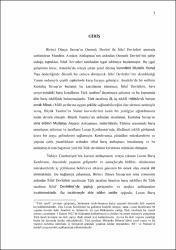| dc.contributor.author | Topaloğlu, Seyhan | |
| dc.date.accessioned | 2020-10-21T11:29:55Z | |
| dc.date.available | 2020-10-21T11:29:55Z | |
| dc.date.issued | 2018 | |
| dc.identifier.uri | https://hdl.handle.net/20.500.11776/3779 | |
| dc.description.abstract | Uluslararası müzakereler ulusların ve dolayısıyla uluslararası ilişkilerin gidişatını etkileyen önemli süreçlerdir. Çalışmada; bu süreçlerde tarafların iç politikaları belirleyici değişken olarak ele alınmakta ve bu değişkenin, özellikle toplumun büyük kesimlerini yakından ilgilendiren ve derinden etkileyen konularda, müzakerelerin gidişatını şekillendiren bir unsura dönüşebildiği ileri sürülmektedir. Bu bakımdan çalışmanın savını desteklemek üzere uluslararası müzakerelere iyi bir örnek teşkil eden ve aynı zamanda bir ulusun kaderini tayin eden Lozan Barış Konferansı örnek olay olarak seçilmiştir. Bununla birlikte, seçilen bu örnek olayı açıklayıcı bir çerçevede incelemek üzere de Rasyonel Seçim Teorisi’ne dayalı olarak Robert Putnam tarafından geliştirilen “İki Aşamalı Oyunlar” modeli tercih edilmiştir. Lozan Barış Konferansı ve sonunda imzalanan antlaşma ile ilgili literatürde yapılan mevcut çalışmalar incelendiğinde, konferansın ve/veya antlaşmanın daha çok uluslararası hukuk ve siyasi tarih açısından ele alındığı görülmektedir. Bu nedenle çalışmada, literatürdeki mevcut çalışmalardan farklı olarak, Mütareke Dönemi ve Lozan Barış Konferansı, Uluslararası Politika alanındaki Rasyonel Seçim Teorisi’nin bir modeli olan Putnam’ın “İki Aşamalı Oyunlar” yaklaşımı çerçevesinde incelenmektedir. Bu anlamda; teorik bir çerçevede, öncesinde yaşanan gelişmelerle birlikte incelenen Lozan Barış Konferansı’nın sonuçlarına ilişkin yapılan bu değerlendirme; literatürdeki mevcut çalışmalara katkı yaparak, toplumun dönemin şahsiyetlerine ve antlaşmanın kazanımlarına ilişkin yargısını oluşturmasında bilimsel bir yol önermektedir. Ayrıca, Türkiye Cumhuriyeti’nin kurucu antlaşmasının imzalandığı Lozan Konferansı boyunca, tarafların tercihlerinin nasıl şekillendiğine dair varılan sonuçlar, çalışmada kullanılan teorik çerçevenin imkânlarıyla elde edilen kanıtlar doğrultusunda, somut gerekçeleriyle birlikte ortaya konulmaya çalışılmaktadır. | en_US |
| dc.description.abstract | International negotiations are important processes affecting the course of nations and thus international relations. Study; In these processes, the internal policies of the parties are considered as decisive variables and it is argued that this variable can be transformed into an element that shapes the progress of the negotiations, especially on issues that are deeply related to the large segments of society. In this regard, the Lausanne Peace Conference, which is a good example of international negotiations to support the argument of the work and which also determines the destiny of a nation, was selected as a case study. However, in order to examine this selected case study in an explanatory framework, was chosen Two-Level Games Model, which was developed by Robert Putnam based on the Rational Choice Theory. When the current studies on the Lausanne Peace Conference and the treaty signed at the end are examined, it can be seen that the conference and / or treaty are mostly addressed in terms of international law and political history. Therefore, unlike the current studies in the literature, the Armistice Period and the Lausanne Peace Conference are examined within the framework of the Putnam's Two-Level Games approach, which is a model of Rational Choice Theory in the field of International Politics. In this sense; this assessment of the results of the Lausanne Peace Conference, which was examined in a theoretical framework with the developments before; by making a contribution to the current studies in the literature, it proposes a scientific way for the society to formulate its judgment on the personalities of the period and the gains of the treaty. In addition, the conclusions of how to shape the preferences of the parties during the signing of the Lausanne Conference of the founding treaties of the Republic of Turkey, the theoretical framework used in the study is tried to be put forward with concrete reasons in line with the evidence obtained. | en_US |
| dc.language.iso | tur | en_US |
| dc.publisher | Namık Kemal Üniversitesi | en_US |
| dc.rights | info:eu-repo/semantics/embargoedAccess | en_US |
| dc.subject | Lozan Barış Konferansı | en_US |
| dc.subject | İki Aşamalı Oyun Modeli | en_US |
| dc.subject | Robert Putnam | en_US |
| dc.subject | Lozan Barış Antlaşması | en_US |
| dc.subject | Lord Curzon | en_US |
| dc.subject | İsmet Paşa | en_US |
| dc.subject | Ismet Pasha | en_US |
| dc.subject | Lausanne Peace Conference | en_US |
| dc.subject | Lausanne Peace Treaty | en_US |
| dc.subject | Lord Curzon | en_US |
| dc.subject | Two Level Games Model | en_US |
| dc.subject | Robert Putnam | en_US |
| dc.title | Lozan Barış Konferansı ve iki aşamalı oyun | en_US |
| dc.type | masterThesis | en_US |
| dc.department | Enstitüler, Sosyal Bilimler Enstitüsü, Küreselleşme ve Uluslararası İlişkiler Ana Bilim Dalı | en_US |
| dc.relation.publicationcategory | Tez | en_US |



















